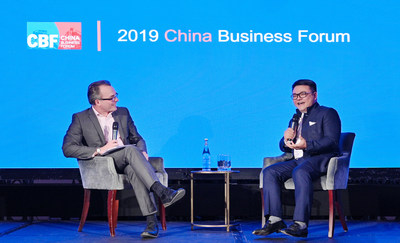Seng Yee Lau Decodes Tencent’s Global Innovation Model at the China Business Forum 2019
Press Releases
May 17, 2019
LONDON, May 17, 2019 /PRNewswire/ — Tencent and London Business School (LBS) collaborated for the first time in developing the Innovation and Agility at Tencent’s WeChat case study, which has been officially added to the LBS curriculum on May 16. This is a first in Tencent’s collaboration with LBS, with hopes for further exchanges in business theory and practice, talent development and other areas in the future.
Seng Yee Lau, Senior Executive Vice President and Chairman of Group Marketing and Global Branding at Tencent expressed, “Openness, partnership and sharing, have become the value consensus in the digital era. With the digital wave sweeping across the global, China’s innovations are getting attention now more than ever. Tencent is in discussion with LBS to actively explore opportunities in this context.”

The WeChat case study is developed by a top international business school for the first time, based on in-depth interviews with Allen Zhang, Senior Executive Vice President, President of Weixin Group, as well as early members of the WeChat team and other senior executives. The case study development is the first undertaking within Tencent’s “Global Business School Cooperation Program”, which was launched in 2018 with the goals of openly sharing Tencent’s business innovations and practices, collaborating with the world’s top business schools, exploring opportunities for joint research on cutting-edge business ideas, aiding the development of the industry, and enabling global talent development and exchange.
Seng Yee Lau was invited to attend the China Business Forum 2019 hosted by LBS. As a representative of China’s Internet technology sector, Lau shared his perspectives on the topic of “China’s innovations”. A flagship event of the school, the Forum builds bridges between the political, business, and academic sectors of the two nations. It is one of the largest and most influential business forums in Europe today.
An important topic at this year’s China Business Forum, “Created in China” is becoming a topic of global attention. Lau expressed that support on a national-strategy level has been the foundation, with the development of Internet technology providing a boost; the borderless nature of the Internet means technology created in China can be shared globally. He believes “Created in China” is driven by innovations, and shared how Tencent seizes the opportunities of the modern era and continues to innovate in business, ecosystems, and society.
At the business level, Tencent is deeply rooted in internet-based technology and culture. “The exploration of basic research and cutting-edge technology have profoundly shaped past technology revolutions in human history. Tencent doesn’t just rely on its own strengths, but also joins the business and academic sectors in contributing to the advancement of science and technology together,” Lau said. Tencent continues to invest in pioneering technologies – such as artificial intelligence (AI), quantum computing, and robotics – and promote technological innovation and application in various fields. It also encourages young scientists to dedicate themselves to basic scientific research. To this end, the Tencent Foundation has committed 1 billion RMB in funding (approximately 112 million GBP) and teamed up with renowned scientists to establish the “Xplorer Prize.” Through industry investment, Tencent also works extensively with partners in various sectors all around the world, constantly exploring innovations and breakthroughs in disruptive technologies.
No matter how advanced technology is, however, culture is irreplaceable, Lau noted. Tencent’s commitment extends to fostering the new culture of the digital age. Tencent subsidiary China Literature brings together 7.3 million readers and is China’s largest digital reading platform, as well as online literary creation platform. Similarly, in the digital culture fields of music, video, gaming, and more, Tencent has maintained its industry leadership through platform innovation.
At the ecosystem level, Tencent enables innovation across businesses and sectors through its open and jointly created ecosystems. Lau shared industry innovation practices from China, such as how China Southern Power Grid was able to cut the time needed for a data sorting task from over one month to just a few days, thanks to Tencent Cloud AI computer vision technology. In retail, the YH Super Species supermarkets have placed QR codes on product labels so that consumers can scan and pay through a WeChat Mini Program, enabling them to quickly shop and be on their way, which significantly improves operational efficiency in retail. Lau noted that, “Tencent will be a good ‘digitalization assistant’ for all businesses and sectors – providing new forms of infrastructure such as cloud computing, big data analytics, and AI capabilities; stimulating partners to create their own digital innovations; and building a digital ecosystem and community together.”
At the societal level, Tencent follows the vision of “technology for good”, helping to build a sustainable world. “Innovation is only a means Tencent hopes that with the help of technological innovation, a smarter, more sustainably developed innovative society can be built,” said Lau. “That’s why we’re advocating in our industry and in society for ‘technology for good’ – using technology to solve problems from medical to educational or even address global challenges such as those relating to food, water, or the environment.” Lau gave the example of how Tencent used computer vision technology to develop the AI Medical Innovation System, which helps doctors interpret diagnostic images. To date, it has read over a hundred million images, with an accuracy rate of 96%, making it an AI system that saves lives. Tencent AI Lab also worked with agricultural experts to create an agricultural AI system that improves the agricultural output and resource utilization. The system improves output by more than five times as compared with human-managed planting, and it won second place at the 2018 Autonomous Greenhouse Challenge.
As the first Chinese internet product to break 1 billion monthly active users, WeChat is Tencent’s most iconic exemplar, and now a case study in a top business school’s curriculum. “Tencent’s open sharing of WeChat’s innovations and practices, together with analysis by LBS and subsequent research with top students around the world, will contribute to the advancement of global business thinking and the building of a more inclusive digital future,” said Professor Julian Birkinshaw, Deputy Dean at London Business School and Professor of Strategy and Entrepreneurship. “The value of the WeChat case study is not just in its representation of China’s innovation. WeChat also demonstrates an advanced level of global innovation, which sets an example to entrepreneurs and is a research subject for innovators.”
Against the backdrop of Chinese innovations going global in recent years, Tencent has accelerated its establishment of international collaborations, adapting its business strengths in a new model of overseas expansion. In May 2018, Tencent and the UK Department for International Trade signed a Memorandum of Understanding to boost the rapid development of the cultural creative industries through digital means, working with the British Tourist Authority, British Broadcasting Corporation (BBC), Springer Nature, and other organizations and enterprises. The initial set of collaborations focused on the three major areas of film and television, art, and gaming.
In January 2019, Tencent and the France National Museums Union (RMN) established a strategic cooperation. Based on Tencent’s New Cultural Creativity experience and digital capabilities, Tencent and RMN are carrying out a deeper cooperative exploration in the domain of cultural exchanges, as well as traditional cultural inheritance and innovation. Together, they also launched the “Global Digital Museums for National Treasures” program to digitize precious Chinese relics in international museum collections, using the power of the Internet to enable more Chinese people to overcome borders to enjoy their country’s historical treasures and experience traditional cultures.
![]() View original content to download multimedia:http://www.prnewswire.com/news-releases/seng-yee-lau-decodes-tencents-global-innovation-model-at-the-china-business-forum-2019-300852565.html
View original content to download multimedia:http://www.prnewswire.com/news-releases/seng-yee-lau-decodes-tencents-global-innovation-model-at-the-china-business-forum-2019-300852565.html
SOURCE Tencent


